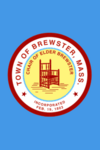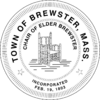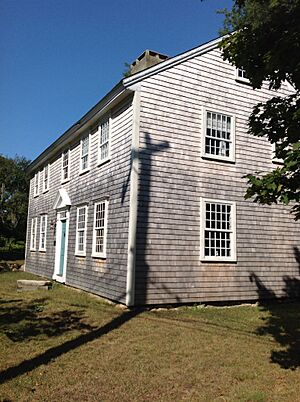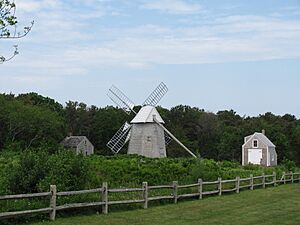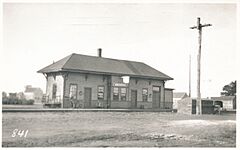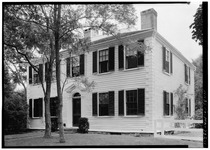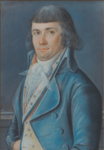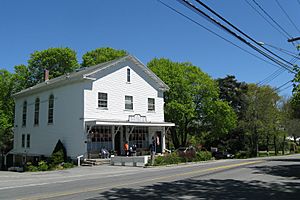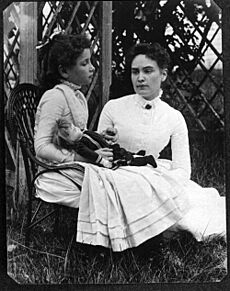Brewster, Massachusetts facts for kids
Quick facts for kids
Brewster, Massachusetts
|
|||
|---|---|---|---|
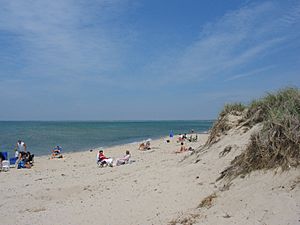
Linnell Landing Beach, on Cape Cod Bay
|
|||
|
|||
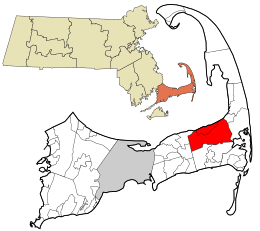
Location in Barnstable County and the state of Massachusetts
|
|||
| Country | United States | ||
| State | Massachusetts | ||
| County | Barnstable | ||
| Settled | 1656 | ||
| Incorporated | 1803 | ||
| Communities |
|
||
| Government | |||
| • Type | Open town meeting | ||
| Area | |||
| • Total | 25.4 sq mi (65.9 km2) | ||
| • Land | 22.9 sq mi (59.3 km2) | ||
| • Water | 2.5 sq mi (6.6 km2) | ||
| Elevation | 39 ft (12 m) | ||
| Population
(2020)
|
|||
| • Total | 10,318 | ||
| • Density | 451/sq mi (174.0/km2) | ||
| Time zone | UTC−5 (Eastern) | ||
| • Summer (DST) | UTC−4 (Eastern) | ||
| ZIP Code |
02631
|
||
| Area code(s) | 508 / 774 | ||
| FIPS code | 25-07980 | ||
| GNIS feature ID | 0618249 | ||
Brewster is a town in Barnstable County, Massachusetts, in the United States. It's located on Cape Cod, a famous arm-shaped peninsula. In 2020, about 10,318 people lived here.
Brewster was first settled in 1659. It is named after Elder William Brewster. He was an important religious leader of Plymouth Colony. Brewster is often called the "Sea Captain's Town." This is because many old homes from the 1700s and 1800s belonged to sea captains. The Cobb House, built in 1799, is one example. It is now home to the Brewster Historical Society.
The town is also home to Nickerson State Park. This huge park is 1,900 acres big. It was once the hunting grounds of the powerful Nickerson Family. You can see their history at the Nickerson Mansion. This building, called Fieldstone Hall, was built in 1890. It was one of the most expensive houses in the country at that time. Today, it's part of the Ocean Edge Resort.
Brewster is a popular place to visit in the summer. Its population can grow to 30,000 people then. It also has two special historic areas. These are the Brewster Old King's Highway Historic District and the Stony Brook–Factory Village Historic District. Both are listed on the National Register of Historic Places. Brewster is also connected with the town of Budleigh Salterton in the United Kingdom.
Contents
History of Brewster
Early Days
Long ago, Native American people lived in Brewster. They settled on the north shore of the town. They farmed near a place called Stony Brook. These tribes are now often called the Nauset people. Before 1617, about 1,200 Native Americans lived on Outer Cape Cod. This number dropped to 500 by 1621 due to sickness.
The first European settlers came to Brewster around Stony Brook. This land was bought in 1653 from Wano and Sachemas. They were leaders of the local Sauguatuckett people. These Native Americans grew a lot of corn, beans, and squash. They sometimes sold these crops to the English settlers.
Brewster was first settled in 1656. It was part of the town of Harwich. By the early 1700s, only about seventeen male settlers lived in what is now Brewster.
Early settlers came from other towns like Sandwich and Plymouth. Many also came directly from England. Throughout the 1700s, farms were spread across the area. The Stony Brook gristmill still stands today. It shows how people used to make things there.
By 1750, about 190 settlers lived in Brewster. Native Americans lived mostly in the southwest part of town. Both settlers and Native Americans used the rich natural resources. They especially used the fish from Cape Cod Bay. Lots of herring, or alewife, were found in Stony Brook. They still are today.
The 1800s
Brewster became its own town in 1803. People in Harwich wanted their own town. This was because most important buildings were in Brewster. Brewster was named after Elder William Brewster. He was a leader of the Pilgrims at Plymouth Colony.
Around this time, many people in Brewster worked in shipping. About 75% of the town's people were involved in sea trades. Brewster captains invested a lot of money in merchant ships. There was also a large saltworks on the Cape Cod Bay shoreline.
By 1865, Brewster had 56 farms. This was the most on the Lower Cape, except for Orleans. Brewster also had many cranberry bogs. Only Harwich and Dennis had more. Rich sea captains built beautiful homes during this time. These homes were in styles like Italianate, Greek Revival, and Second Empire. The most famous house from this time is the Crosby Mansion. Albert Crosby built it in 1888.
Historic Places to See
- Cape Cod Museum of Natural History
- Stony Brook Grist Mill (1873)
- Dillingham House (1660)
- Nickerson Mansion (1906)
- Old Higgins Farm Windmill (1795)
- Crosby Mansion (1888)
Gallery
-
Postcard showing Cliff Pond in Nickerson State Park
-
.
Harris Black House (1795)
-
.
Old Higgins Farm Windmill, listed on the National Register of Historic Places (1795)
Geography of Brewster
Brewster covers about 65.9 square kilometers (25.4 square miles). Most of this is land, and about 6.6 square kilometers (2.5 square miles) is water.
The town is next to Cape Cod Bay on its north side. To the west is Dennis. To the south is Harwich. And to the east is Orleans. Brewster is often split into two areas: West Brewster and East Brewster.
One special feature is the Brewster Flats. These are huge sandy areas that appear at low tide. They stretch out into Cape Cod Bay. Brewster is also home to Roland C. Nickerson State Forest Park. This is the biggest state forest on Cape Cod.
The town has several large ponds. Many are near the Harwich town line. There are also many small streams that flow into Cape Cod Bay. The bay has several places where you can launch boats and enjoy the beaches.
Brewster is home to Long Pond, the largest pond on Cape Cod. The border between Brewster and Harwich runs right through the middle of it. Cliff Pond is Brewster's second largest pond. It is located inside Nickerson State Park. Both ponds are very popular places to visit.
Climate and Nature
Brewster has a climate with warm summers. It gets rain all year round. The average snowfall from November to April is about 30 inches (76 cm). February is usually the snowiest month.
The natural plants in Brewster are mostly Oak and Pine trees. You can also find a mix of other forest trees.
Getting Around Brewster
U.S. Route 6 goes through the southeast part of Brewster. It's a two-lane highway. Other main roads include Massachusetts Route 6A, which is Main Street. Routes 124 and 137 also end in Brewster.
There are no train or airplane services directly in town. But you can enjoy the Cape Cod Rail Trail. This is a popular path for biking and walking. Several other bike trails also go through Brewster. The closest small airport is in Chatham. For bigger flights, you can go to Barnstable Municipal Airport. For national and international flights, Logan International Airport in Boston is the closest.
People of Brewster
| Historical population | ||
|---|---|---|
| Year | Pop. | ±% |
| 1850 | 1,525 | — |
| 1860 | 1,489 | −2.4% |
| 1870 | 1,259 | −15.4% |
| 1880 | 1,144 | −9.1% |
| 1890 | 1,003 | −12.3% |
| 1900 | 829 | −17.3% |
| 1910 | 631 | −23.9% |
| 1920 | 688 | +9.0% |
| 1930 | 769 | +11.8% |
| 1940 | 827 | +7.5% |
| 1950 | 987 | +19.3% |
| 1960 | 1,236 | +25.2% |
| 1970 | 1,790 | +44.8% |
| 1980 | 5,226 | +192.0% |
| 1990 | 8,440 | +61.5% |
| 2000 | 10,094 | +19.6% |
| 2010 | 9,820 | −2.7% |
| 2020 | 10,318 | +5.1% |
| 2022 | 10,444 | +1.2% |
| * = population estimate. Source: United States Census records and Population Estimates Program data. |
||
In 2000, there were about 10,094 people living in Brewster. There were 4,124 households. Most people were White. A small number were Black, Native American, or Asian. About 1% of the population was Hispanic or Latino.
The average household had about 2.34 people. The average family had about 2.79 people. The median age in town was 47 years old. This means half the people were younger than 47, and half were older.
Schools in Brewster
Brewster is part of the Nauset Regional School District. This district also includes Eastham, Orleans, and Wellfleet. Younger students in Brewster go to Stony Brook Elementary School (kindergarten to second grade). Older elementary students attend Eddy Elementary School (third to fifth grades).
Middle school students usually go to Nauset Middle School in Orleans. Another option is the Cape Cod Lighthouse Charter School in East Harwich. For high school, students attend Nauset Regional High School in North Eastham.
Students can also choose to go to Cape Cod Regional Technical High School in Harwich. There are also two private schools in town for elementary students: The Family School and The Laurel School.
Fun Things to Do
- Brewster Conservation Trust Walking Trails
- Brewster Historical Society Museum
- Brewster Ladies' Library
- Cape Cod Museum of Natural History
- Factory Village
- First Parish Brewster
- Stony Brook Grist Mill
Sports and Outdoor Fun
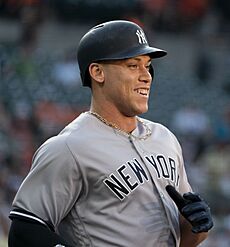
Brewster is home to the Brewster Whitecaps. This is a summer baseball team for college players. They play at Stony Brook Field. Many famous baseball players have played for the Whitecaps. These include Aaron Judge, Billy Wagner, and Chase Utley.
Brewster has many great beaches on Cape Cod Bay. Some popular ones are Crosby Landing, Linnell Landing, and Breakwater Beach. Besides beaches, there are many other fun places outdoors.
Drummer Boy Park on Route 6A has walking trails and picnic areas. It also has a playground. You can see an old 18th-century windmill there, the Old Higgins Farm Windmill. The Cape Cod Museum of Natural History has hiking trails. One trail, the John Wing Trail, goes over a boardwalk to Wing Island and the beach.
Nickerson State Park has 1900 acres of woods. It has almost 8 miles of biking trails that you can also hike. There are also hiking trails around several ponds. Punkhorn Parklands is another large protected woodland. It has thousands of acres with many hiking trails. The trail to Eagle Point is very popular. There are also smaller nature areas for hiking around town.
Famous Connections
The song "Alone in Brewster Bay" by Minnie Riperton is about her vacationing on Cape Cod. This was in the early 1970s.
Samuel M. Nickerson was a very important business leader. He was the president of the First National Bank of Chicago. His summer home in Brewster, Fieldstone Hall, is now a resort called Ocean Edge.
In a TV show called Who Do You Think You Are?, actress Ashley Judd found out she is a direct descendant of William Brewster. He is the person Brewster is named after!
See also
 In Spanish: Brewster (Massachusetts) para niños
In Spanish: Brewster (Massachusetts) para niños
 | Isaac Myers |
 | D. Hamilton Jackson |
 | A. Philip Randolph |


